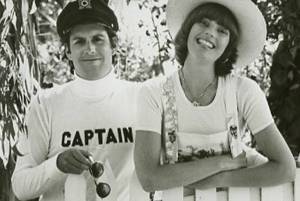By Randal C. Hill
Imagine that you are a multi-talented singer-pianist who just isn’t “happening” in the music-recording world. You might ask yourself, “What would it take to soar to the heights of this world, ride high on the hit charts, and sell out concerts night after night? I’ve got both the pipes and the looks for success. Over the years I’ve learned the ins and outs of the record business. I’ve even managed to sign with a small label and release an LP, even though it bombed.”
Such is a conversation 31-year-old Barry Manilow could have had with himself as the year 1974 began to wind down.
Eventually he would grab the elusive brass ring, but he nearly blew his chance when he did.
He met the right person—record-business veteran Clive Davis, who would soon change the life of the frustrated Brooklynite. After being a Columbia Records executive, Davis was about to take over Bell Records—Manilow’s recording home—and rename it Arista Records.
To see what Barry had to offer, Clive went to evaluate him when Manilow opened a show for Dionne Warwick. “I was really taken by his performance,” the businessman enthused later in his autobiography. “He was a terrific singer, and his manner was upbeat, funny and self-deprecating. The audience loved him.”
Davis believed that none of Manilow’s maiden LP tracks had shown the potential to be a hit single (at the time a necessity for most new artists seeking success). To the super-savvy Clive, there was nothing more important than to correctly match the just-right singer with the just-right material and the just-right production.
Manilow knew that Davis had primarily worked with rock artists, but Barry had no real interest in rock ‘n’ roll. Clive thus set about casting for something suitable—no, perfect—for his talented protege. Davis had nurtured the early careers of several recording luminaries and knew how to connect good artists with good songs.
Sifting through hundreds of discs, Clive was drawn to an obscure tune called “Brandy,” a mid-chart 1971 British hit by American expatriate Scott English. But when Davis showed Manilow the hauntingly beautiful ballad of lost love and regret, Barry balked, thinking “Brandy” would at best be an album-track “filler” and that English’s tune would be of no help to him as a career-launcher. Clive disagreed and pushed hard for a first-class production and promotion. Eventually, Manilow decided not to argue with his new boss (good idea!) and reluctantly agreed to record the song.
Davis had the disc’s title tweaked to avoid confusion with the 1972 Looking Glass hit “Brandy (You’re a Fine Girl).” To Barry’s amazement, “Mandy”—as it was now known—shot to the top of the Billboard chart, and Barry Manilow was instantly catapulted into the pantheon of recording superstars.
You can see and hear the original British hit of “Brandy.” Go to Google, key in YouTube, add “Brandy Scott English,” then select the concert video clip. You’ll find that it’s 1971 UK “cool” at its very best! ISI









